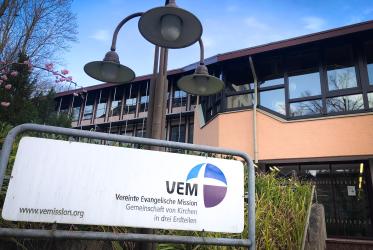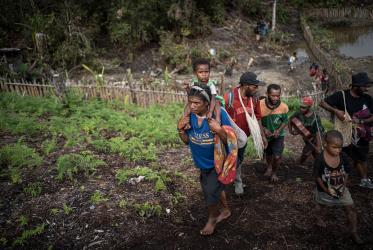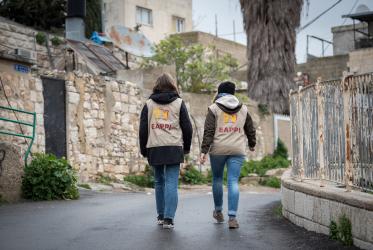Background information and suggestions for advocacy, issued in Geneva, June 1999.
An appeal addressed to the World Council of Churches Eighth Assembly in Harare last December has been given wide circulation by African Rights, a London-based non-governmental organization, and questions arising from this appeal have been addressed to the World Council of Churches. This note is to inform churches and related organizations of initiatives taken by the World Council of Churches in relation to the Rwandan tragedy.
Early warning and efforts to avoid the conflict
The WCC has followed the evolution of events in Rwanda and Burundi since at least the early 1970s, when a report on these conflicts was presented to the Commission of the Churches on International Affairs (CCIA). From 1991, the WCC sent signals to the governments directly involved, to the wider international community and to the churches, of the danger signs, and engaged together with the All-Africa Conference of Churches (AACC) in efforts to bring conflicting parties together to resolve their differences through negotiation.
- On 10 January 1991, the Director of CCIA addressed a letter to the President of Rwanda expressing alarm at the "persistent reports of arrests, torture and killings of civilians as a result of the actions" of Rwandan security forces, and calling for measures to be taken to correct "inhuman conditions" in Rwandan prisons and to guarantee respect for human rights as a means of restoration of peace and justice for all citizens of Rwanda.
- In response to an appeal by the churches of Rwanda, a joint WCC-AACC consultation on Rwanda was convened in Nairobi, 19-22 August 1991, bringing together church leaders and representatives of governments and refugees in the region. In his address to the Consultation, the WCC General Secretary drew attention once again to the crisis, and appealed to all parties to bring an end to violence and warfare.
- On 21 October 1993 the Acting General Secretary wrote to the Secretary-General of the United Nations, informing him of the peace accord in Rwanda recently concluded through the mediation of the churches with the support of the AACC, the WCC and the World Alliance of Reformed Churches. He urged international action in response to the coup d'état which had taken place the previous night in Burundi in order to avoid a tragic destabilization of the situation in the region.
- These mediation efforts continued up to the time of the genocide, but were cut short by the deaths in Kigali of the presidents of Rwanda and Burundi when the plane in which they were travelling was apparently shot down.
- On 7 April 1994, the morning after this tragedy, the WCC General Secretary issued an "urgent appeal to the people of Burundi and Rwanda not to respond to the tragedy with renewed acts of terror and ethnic warfare", and appealed to the international community "not to abandon peoples long plagued by social and political chaos, ...misery and massive violence. He warned that the "ethnic conflicts in Rwanda and Burundi (threaten) to spill over into the wider region, exacerbating tensions in neighbouring countries... The peace and democratic future of the region, and to a great extent of the whole of Africa is at state." He called "on all nations and competent international organizations to redouble efforts to assure order in these countries in the wake of this tragedy."
- Two weeks later, on 18 April 1994, the WCC General Secretary condemned the widespread killings in Rwanda, recalling his own visit to Rwanda five months earlier. Noting that the "suffering of the Rwandan people has gone beyond the limits of understanding," he called on the international community to "be ready to assist in every possible way to bring about a cessation of hostilities, a peaceful solution to the conflict, and humanitarian assistance to the suffering."
- In May and June of 1994 other letters were sent to the Secretaries-General of the OAU and the UN, to the Chairman of the Rwandan Patriotic Front, to French Foreign Minister, Alain Juppé, and to the new Rwandan President Bizimungu.
Criminal responsibility for actions during the genocide
In the hope of establishing in Rwanda a process similar to that which had been followed earlier in El Salvador and in Guatemala, the WCC appealed to the UN to put in place an effective Human Rights delegation "to provide protection and to establish the facts with respect to responsibility for the massive violations of human rights which have occurred in that country."
Within months of the genocide, African Rights published a book with substantial information on individuals judged to be in complicity with or directly responsible for mass killings, listing among them many of the persons with churche leadership responsibilities, including most of those named in the document now in circulation. Following criticism that the facts on a number of cases cited were erroneous, Africa Rights published a corrected version of its charges.
At about the same time, the WCC published a book by Hugh McCullum, The Angels Have Left Us, which dealt with, among other things, the stories about both acts of heroism of Christians in the face of adversity and complicity of some church leaders. As an estimated ninety percent of the population of Rwanda is Christian, by sheer numbers the majority of the victims, and the perpetrators, of the 1994 genocide were Christians. A chapter on The Church: Problems and Promises goes into detail about the confusion and shortcomings of the Rwandan churches in this terrible period, but also points to hopeful signs for the resurgence of a faithful witnessing church.
In September 1994, the WCC Executive Committee considered a range of complex issues related to war in the context of reflections on the anniversary of the end of World War II. A paper provided to guide that discussion contained the following commentary:
In Rwanda, there is growing evidence of the complicity of some church leaders with political groups and militia who appear to have organized the first massacres of Tutsis and politically suspect Hutus, and to have fanned the flames of ethnic hatred into the genocidal furore which ensued. According to reports gradually being gathered from refugees and people who stayed behind, pastors, priests and lay leaders may well have been among those who betrayed people of another ethnic group, or even participated directly in the killing.
One must immediately add that some pastors, priests and lay leaders have accompanied their people to the refugee camps where they are seeking to minister to their pain. Stories are emerging of people, certainly many of them Christians, who sacrificed their own lives trying to shield members of another group.
More cases of both betrayal and martyrdom will certainly emerge in the days ahead. But the bitter memory of those who preached the love of God and served as leaders of churches who abandoned or betrayed members of their own flock will long remain in the land. Clearly, the ecumenical movement cannot ignore this reality. While insufficient evidence is in hand to name individuals related to the churches who may have been involved, the WCC and the AACC have taken the position that no one should be shielded from international inquiries aimed at establishing the truth about those responsible for this slaughter. (Emphasis added)
It is not at all clear that one can apply the criteria to this situation that derive from the German church experience between 1933 and 1945, but the questions inevitably arise: Where are the prophets in these churches? Have there been the likes of a Dietrich Bonhoeffer here, whose message has been expressed in words and actions which have been ignored by or inaccessible to the churches outside? Has there been the equivalent of a "Confessing Church" in Rwanda which we have failed to recognize or to support? Had the churches abroad been more attentive to the attitudes of some church leaders in Rwanda, would their churches have been denied admission to the fellowship, or pressed harder to assume their responsibility as peacemakers and witnesses to the love of Christ for all people? Do we expect a confession from the new church emerging in Rwanda of Christians' complicity?
We must confess, as an ecumenical fellowship, along with our forebears in the First Assembly, that
We have to accept God's judgment upon us for our share in the world's guilt. Often we have tried to serve God and mammon, put our loyalties before loyalty to Christ, confused the Gospel with our own economic or national or racial interests and feared war more than we have hated it. As we have talked with each other here, we have begun to understand how our separation has prevented us from receiving correction from one another in Christ. And because we lacked this correction, the world has often heard from us not the Word of God but the words of men.
The broad Church World Action - Rwanda programme being implemented now by the churches of Africa and beyond calls for intensive efforts to help rebuild multi-ethnic communities and a new, more tolerant Rwandan society. Central to those efforts will be to assist Rwandan Christians to reconstitute a faithful, servant church. How do we prepare ourselves for this? Of what corrections of our own behaviour are we in need in order to be regarded as bearers of the Word of God in a suffering Rwanda?
Post-conflict response
A massive ecumenical effort was engaged through the creation of a new international humanitarian response mechanism, Church World Action-Rwanda, on which full details are available now through ACT (Action by Churches Together). This response was a comprehensive one, seeking in a creative way to work with refugees who had fled Rwanda into neighbouring countries, and at the same time seeking to address the critical internal needs of the country through humanitarian assistance, trauma counselling teams, and capacity building in the local churches whose leadership had been decimated.
Consistent efforts were engaged to equip the churches in the Great Lakes Region to respond together to the ever-expanding crisis set in motion by the events in Rwanda.
In December 1994 the WCC convened a private meeting with leaders of nearly all the churches in the North which had historic links with Rwandan churches (including the Roman Catholic Church). The main purpose of the meeting was to share information and, in so far as possible, develop a common stance on issues related to alleged complicity of some Rwandan church leaders with the genocide and on the reconstruction of a witnessing church. The meeting started with a time of repentance and confession by the churches in order to establish a framework for participation in the process of forgiveness, reconciliation and healing.
In November 1996, the WCC brought together Rwandan church leaders to provide a platform for serious soul-searching on the part of the church leadership, and to begin in a small way the long process to repentance and confession. The meeting, held in Johannesburg, South Africa, was attended by church leaders from inside Rwanda (representing the remnant church) and church leaders in exile in neighbouring countries - Burundi, Democratic Republic of Congo, Uganda, Kenya, Tanzania and South Africa. The gathering brought out the tensions among the church leaders themselves. For 24 hours they would not sit in the same room even to pray. But eventually a way was found to bring the participants together for difficult, yet fruitful work.
From this meeting, a Core Group was formed to plan the next steps, including ecumenical visits, facilitated by the WCC, to the region and especially by church leaders from the region to stimulate a process of repentance, forgiveness and healing. In the following years ecumenical visits to Rwanda, Burundi, Uganda, Kenya and Tanzania took place. The Core Group called a second meeting in Entebbe, Uganda in March 1997, and another in Kigali, Rwanda in September 1997 which formulated the Kigali Principles for common Christian witness for peace and reconciliation.
In October 1997 the WCC convened the Global Ecumenical Forum on the Great Lakes region attended by church representatives from the Great Lakes region, Europe and North America. Among other things it endorsed the Kigali Principles and outlined a platform of action which eventually led to the formation in March 1999 of FECCLAHA (Fellowship of Councils and Churches in Great Lakes and Horn of Africa). The membership of FECCLAHA includes councils and churches of Rwanda, Burundi, Uganda, Democratic Republic of Congo, Kenya, Tanzania, Ethiopia, Eritrea and Southern Sudan. The main foci of FECCLAHA are peace, reconciliation, and the healing of memories.
Some conclusions
The WCC was energetic in seeking to provide early warning signs to the churches and the wider international community about the impending disaster in Rwanda. While no one could predict the dimensions of the conflict which ensued, its potential character and amplitude were foreseen, and every possible effort was made both directly and through wider advocacy to prevent it.
When the worst occurred, the WCC was equally energetic in seeking to limit the damage and to begin to help reconstruct the basis for peace among embattled ethnic groups, and to equip the churches to rebuild in a way which would help them learn from the past and become a faithful witness for peace and democracy to be reconstructed on the killing fields.
While the WCC was careful not to rush to judgment on individual cases, it was consistent with its long-standing positions in calling for effective international investigative missions to be sent to Rwanda to establish the truth about what had occurred, and to identify those responsible for crimes against humanity. It called for the creation of effective international tribunals to be created in order to bring those responsible for crimes to justice as a part of its broader efforts to counter the widespread trend of giving impunity to such persons. The WCC has excluded no one from accountability for such crimes rather, explicitly, has indicated that church leaders themselves must answer to charges made against them.
Neither the WCC nor its member churches are in a position to exercise such justice. Member churches whose members are among those against whom charges have been made are restricted to the application of ecclesial sanctions which vary from one confession to another. In fact, a private meeting was held early on with heads of mission boards of most churches who have historic ties with Rwandan churches to provide them an opportunity to consult together on this and related questions.
In the end, the administration of the law and legal sanctions rest with national and international systems and institutions empowered to apply the law. As the recent case of the charges placed against General Augusto Pinochet of Chile has shown, precedents are now clearly established that not only the government of the country where offenses were committed is responsible for pursuing crimes against humanity, but also that this is a shared international obligation. The WCC in general, and in the particular case of Rwanda, has repeatedly appealed for such precedents to be followed, for the International Tribunal on Rwanda to be adequately supported to pursue its appointed task, and for the creation of an International Criminal Court.
The WCC will continue to advocate for such means to guard against the injustice which is compounded by the granting by intent or default of impunity to authors of crimes against humanity. Churches, agencies, other civil society actors and individuals all have an advocacy role to play here with their national governments.





